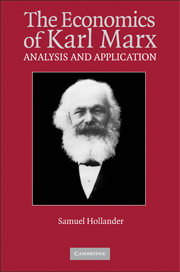Book contents
- Frontmatter
- Contents
- Preface
- Introduction
- Part One CAPITAL: PRINCIPLE FEATURES OF THE MARXIAN “CANON”
- 1 Value and Distribution
- 2 Elements of Growth Theory
- 3 Economic Growth and the Falling Real-Wage Trend
- 4 Economic Growth and the Falling Rate of Profit
- 5 The Cyclical Dimension
- Part Two ORIGINS: MARX IN THE 1840s
- Part Three A “SECOND DRAFT” OF CAPITAL: THE GRUNDRISSE 1857–1858
- Part Four A “THIRD DRAFT” OF CAPITAL: THE ECONOMIC MANUSCRIPTS 1861–1863
- Part Five TOPICS IN APPLICATION
- Conclusion: A Recapitulation and Overview
- Appendices
- Bibliography
- Index
1 - Value and Distribution
Published online by Cambridge University Press: 25 June 2009
- Frontmatter
- Contents
- Preface
- Introduction
- Part One CAPITAL: PRINCIPLE FEATURES OF THE MARXIAN “CANON”
- 1 Value and Distribution
- 2 Elements of Growth Theory
- 3 Economic Growth and the Falling Real-Wage Trend
- 4 Economic Growth and the Falling Rate of Profit
- 5 The Cyclical Dimension
- Part Two ORIGINS: MARX IN THE 1840s
- Part Three A “SECOND DRAFT” OF CAPITAL: THE GRUNDRISSE 1857–1858
- Part Four A “THIRD DRAFT” OF CAPITAL: THE ECONOMIC MANUSCRIPTS 1861–1863
- Part Five TOPICS IN APPLICATION
- Conclusion: A Recapitulation and Overview
- Appendices
- Bibliography
- Index
Summary
Introduction
According to “Cambridge” or “neo-Ricardian” or “Sraffian” historiography, “the nature of [Marx's] approach required him to start from the postulation of a certain rate of exploitation or of surplus-value (or profit-wage ratio in Ricardo's terms); since this was prior to the formation of exchange-values or prices and was not derived from them. In other words, this needed to be expressed in terms of production, before bringing in circulation or exchange” Dobb 1973: 148). Similarly: “price-relations or exchange-values could only be arrived at after the principle affecting distribution of the total product had been postulated. The determinants of distribution … were sited in conditions of production (Ricardo's conditions of production of wage-goods; Marx's “social relations of production,” introduced from outside the market, or as it were from a socio-historical fundament to phenomena of exchange)” (169). In a more technical rendition by Medio prices are derived on the basis of a known general profit rate which is itself “a function of two basic features of the economy, namely a social factor, the rate of exploitation” – which implies the wage – “and a technical factor, the methods of production” specifically of so-called “basics” or commodities which are either means of production or wage goods entering into the production of all goods in the system (1972: 330–1, 340–1). Implied here is a very different conception of the economic process than that of “general-equilibrium” characterized by the interdependence of distribution and pricing (Dobb: 118–19).
- Type
- Chapter
- Information
- The Economics of Karl MarxAnalysis and Application, pp. 11 - 54Publisher: Cambridge University PressPrint publication year: 2008

